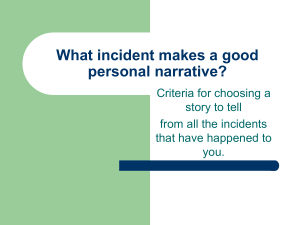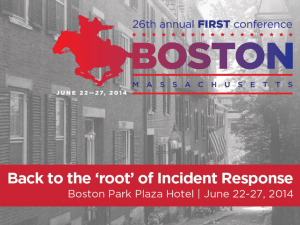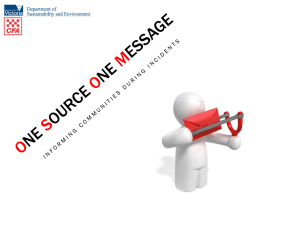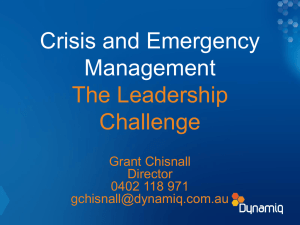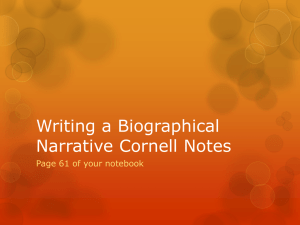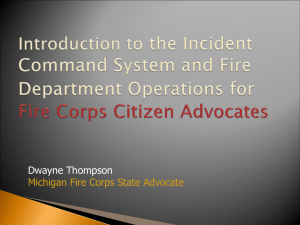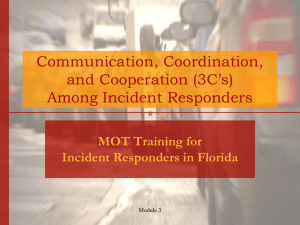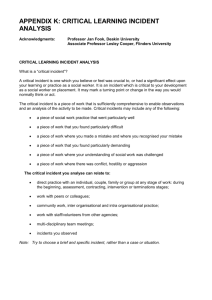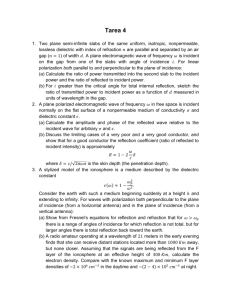CRITICAL LEARnING ANALYSIS
advertisement
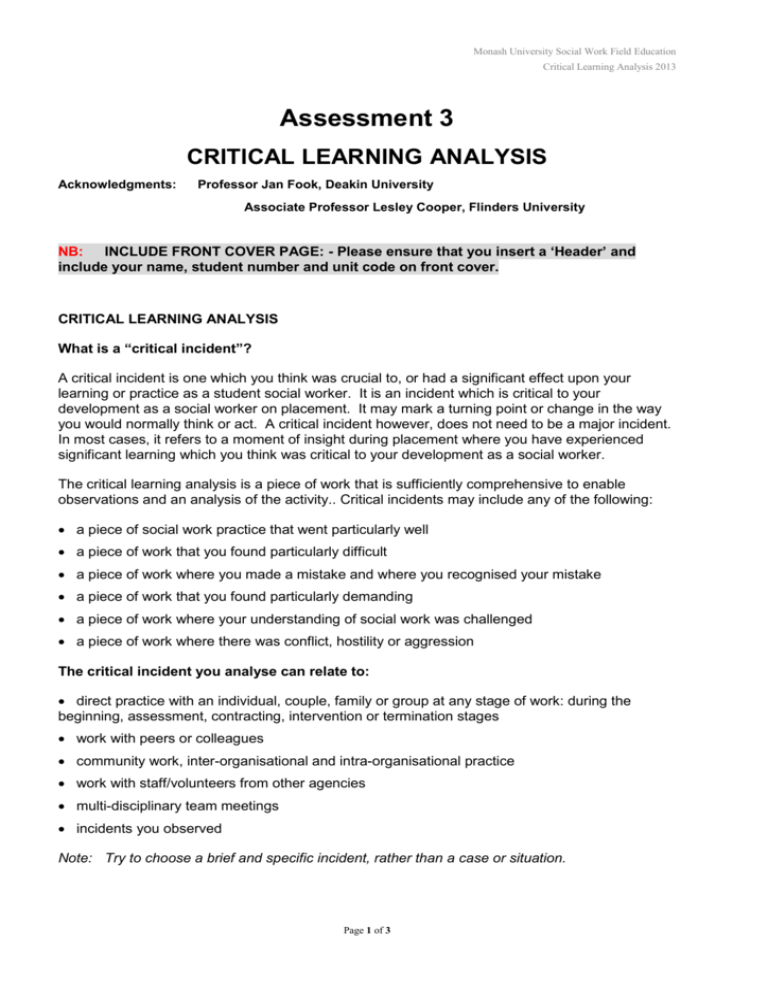
Monash University Social Work Field Education Critical Learning Analysis 2013 Assessment 3 CRITICAL LEARNING ANALYSIS Acknowledgments: Professor Jan Fook, Deakin University Associate Professor Lesley Cooper, Flinders University NB: INCLUDE FRONT COVER PAGE: - Please ensure that you insert a ‘Header’ and include your name, student number and unit code on front cover. CRITICAL LEARNING ANALYSIS What is a “critical incident”? A critical incident is one which you think was crucial to, or had a significant effect upon your learning or practice as a student social worker. It is an incident which is critical to your development as a social worker on placement. It may mark a turning point or change in the way you would normally think or act. A critical incident however, does not need to be a major incident. In most cases, it refers to a moment of insight during placement where you have experienced significant learning which you think was critical to your development as a social worker. The critical learning analysis is a piece of work that is sufficiently comprehensive to enable observations and an analysis of the activity.. Critical incidents may include any of the following: a piece of social work practice that went particularly well a piece of work that you found particularly difficult a piece of work where you made a mistake and where you recognised your mistake a piece of work that you found particularly demanding a piece of work where your understanding of social work was challenged a piece of work where there was conflict, hostility or aggression The critical incident you analyse can relate to: direct practice with an individual, couple, family or group at any stage of work: during the beginning, assessment, contracting, intervention or termination stages work with peers or colleagues community work, inter-organisational and intra-organisational practice work with staff/volunteers from other agencies multi-disciplinary team meetings incidents you observed Note: Try to choose a brief and specific incident, rather than a case or situation. Page 1 of 3 Monash University Social Work Field Education Critical Learning Analysis 2013 USE THE FOLLOWING FORMAT TO WRITE ABOUT AND DISCUSS YOUR CRITICAL INCIDENT. THERE ARE NINE (9) SECTIONS IN THE REPORT. 1. Describe the context of the incident (for example, how far into placement it happened, your role in the agency at the time, the time of day, type of agency, etc) 2. Describe the actual incident in detail 3. Why was the incident critical to your learning? 4. What were your concerns at the time? 5. What were you thinking and feeling as it was taking place; and afterwards? 6. Was anything particularly demanding about the situation? 7. What did you learn about: (a) • • social work as a profession, for example, values, roles, ethics? yourself as a social work professional? (b) • • social work practice, that is, skills? yourself as a social work practitioner? (c) • • social work practice theory? yourself as a learner? 8. What were some of your theoretical assumptions (for example, about social work, causes of human behaviour, styles of intervention) which were reflected in this incident? 9. How has your learning from this incident changed your thinking and your practice? Use of Critical Thinking Techniques Critical thinking involves the challenging of underlying beliefs, values, assumptions and behaviour. Asking ‘how’ and ‘why’ questions encourages awareness of assumptions and beliefs. The steps in critical thinking are as follows: An event or a sequence of events (for example, a difficult home visit, death of a patient) precipitates a search for meaning. The feelings that accompany the event should be noted, together with a description of the occurrence An appraisal of the event or problem that has presented as challenging or contradictory is prepared An exploration of alternative ways of thinking, reading or doing things gives rise to new concepts - or even such a significant change as a new ‘world view’ New ideas are then integrated into the student’s repertoire. Page 2 of 3 Monash University Social Work Field Education Critical Learning Analysis 2013 Issues to be addressed in writing a Critical Learning Analysis Working on a critical learning analysis involves significant reflection on what we do when taking action as professional social workers. This reflection relates to our beliefs and values and how these impact on and are reflected in our actions. This reflection is essential to the development of professional judgement and competent practice. The reflection involved in analysing critical learning incidents requires a level of objectivity about yourself and the impact of your actions that is not necessarily automatic or easy to develop. What you notice and how you reflect on it is determined by your view of the world which has been affected by such things as your cultural background, gender, beliefs, values and your own life experiences. In writing a critical learning analysis you need to address the issue that is within your own experience, remembering that there are probably areas that are hidden or invisible to you at your current level of professional awareness. What this means is that you have to be prepared to ask yourself questions so that you can use critical learning analysis as a mechanism to gain insight into your current level of professional awareness and to broaden your analysis. Why do I view the situation like that? What assumptions have I made about the client/problem/situation? How else could I interpret the situation? What other action could I have taken that may have been more helpful? The achievement of this broadened awareness requires significant levels of objectivity about yourself and an openness to viewing situations differently. It may also require reflection upon the possible need to change some of your own behaviour. The other issue to be addressed in producing a critical learning analysis is the same as with all other written documents concerning clients. Confidentiality must be maintained by omitting or changing all identifying information. Advantages a) Critical learning analyses are highly effective mechanisms for examining and reflecting on your own beliefs and actions, and how they impact on your performance as a developing social worker. b) Critical learning analysis can be used in relation to a wide range of learning goals. c) Critical learning analysis provides you with the opportunity to consider the factors which underpin your actions, within the context of your own learning. Undertaking this activity as a student, while it may be personally demanding, means that you have the support of your supervisor and university staff while learning. Disadvantages a) Compiling a critical learning analysis can be demanding and somewhat uncomfortable if the focus is on a piece of practice that was not as you would have liked it to be. In this way, it can test your ability to appraise yourself honestly and to maintain a flexible, non-defensive stance. Word Limit: 1500 WORDS References: 4 – 6 academic references Due Date: Your Critical Learning Analysis is due week 7. It is to be e-mailed to the University liaison person by the end of the 7th week and before your liaison visit. (Please ensure that you insert a ‘Header’ with your name, student number and unit code) Page 3 of 3

